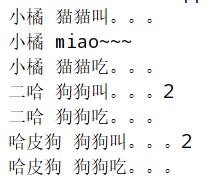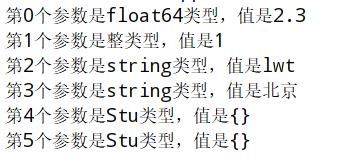Go语言之面向对象-多态与类型断言
Posted 程序彤
tags:
篇首语:本文由小常识网(cha138.com)小编为大家整理,主要介绍了Go语言之面向对象-多态与类型断言相关的知识,希望对你有一定的参考价值。
类型断言
使用方法:
接口实例.(具体结构体子类)。
综合使用:
if 子类实例名,ok := 接口实例.(子类);ok{如果true子类实现了该接口,即进行一系列处理}
// 调用猫猫特有的喵喵方法。
if cat,ok := animal.(Cat);ok{ // 如果类型断言是cat成功
cat.Miao()
}
package main
import "fmt"
func main() {
//zoo:=Zoo{}
//cat:=Cat{}
//dog:=Dog{}
//
多态
//zoo.coming(cat)
//zoo.coming(dog)
var animalArr [3]Animal2
animalArr[0] = Cat{"小橘"}
animalArr[1] = Dog{"二哈"}
animalArr[2] = Dog{"哈皮狗"}
// 遍历自定义类型数组
var zoo Zoo
for _,v:=range animalArr{
zoo.coming(v)
}
}
/*
动物
*/
type Animal interface {
Shout() // 叫
Eat() // 吃
}
/*
猫狗的吃叫方法也隐式实现了这个接口
定义好的接口,我就放这,你若实现了我接口中的所有方法,你这个结构体就是实现了接口。
*/
type Animal2 interface {
Shout() // 叫
Eat() // 吃
}
/*
猫
*/
type Cat struct {
Name string
}
func (cat Cat) Shout(){ // 都不知道这个方法属于Animal这个接口。。
fmt.Println(cat.Name,"猫猫叫。。。")
}
func (cat Cat) Eat(){
fmt.Println(cat.Name,"猫猫吃。。。")
}
func (cat Cat) Miao(){
fmt.Println(cat.Name,"miao~~~")
}
/*
狗
*/
type Dog struct {
Name string
}
func (dog Dog) Shout(){
fmt.Println(dog.Name,"狗狗叫。。。2")
}
func (dog Dog) Eat(){
fmt.Println(dog.Name,"狗狗吃。。。")
}
/*
动物园
*/
type Zoo struct {
}
/*
动物园
*/
func (zoo Zoo) coming(animal Animal2){
// 通过接口调用
animal.Shout()
// Cat特有的Miao()方法这里无法直接调用。解决:类型断言
if cat,ok := animal.(Cat);ok{ // 如果类型断言是cat成功
cat.Miao()
}
animal.Eat()
}

案例二:
类型断言,循环判断传入参数的类型
package main
import "fmt"
func main() {
var n1 float64 = 2.3
var n2 int = 1
var name string = "lwt"
address := "北京"
stu1 := Stu{}
stu2 := &Stu{}
TypeJudge(n1,n2,name,address,stu1,*stu2)
}
func TypeJudge(items ...interface{}) {
for index, v := range items {
switch v.(type) {
case bool:
fmt.Printf("第%v个参数是bool类型,值是%v\\n", index, v)
case float64:
fmt.Printf("第%v个参数是float64类型,值是%v\\n", index, v)
case int,int32,int64:
fmt.Printf("第%v个参数是整类型,值是%v\\n", index, v)
case string:
fmt.Printf("第%v个参数是string类型,值是%v\\n", index, v)
case Stu:
fmt.Printf("第%v个参数是Stu类型,值是%v\\n", index, v)
case *Stu:
fmt.Printf("第%v个参数是Stu类型,值是%v\\n", index, v)
default:
fmt.Printf("第%v个参数的类型不确定,值是%v\\n",index,v)
}
}
}
type Stu struct {
}

以上是关于Go语言之面向对象-多态与类型断言的主要内容,如果未能解决你的问题,请参考以下文章